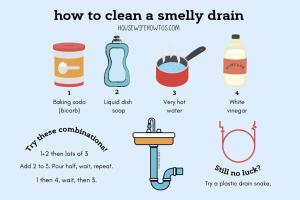Effective Ways to Deodorize Stinky Drains (Plus, How to Prevent Smells)

-
Quick Links:
- Understanding Drain Odors
- Common Causes of Drain Smells
- Effective Deodorizing Methods
- Natural Remedies for Stinky Drains
- Preventive Measures to Avoid Smells
- Case Studies on Drain Odor Solutions
- Expert Insights on Drain Maintenance
- FAQs
Understanding Drain Odors
Drain odors are a common nuisance in households and can often signal deeper plumbing issues. Understanding the science behind these smells is essential for effective management.
Unlike regular smells, drain odors are typically caused by a buildup of organic materials, bacteria, and other residues that collect over time. When waste decomposes within pipes, it releases gases such as hydrogen sulfide and methane, leading to unpleasant odors.
Common Causes of Drain Smells
- Organic Material Buildup: Food particles, hair, and grease can accumulate in drains.
- Dry P-Traps: If a P-trap dries out, it can allow sewer gases to escape into the home.
- Clogged Pipes: Blockages can trap waste and create odors.
- Improper Venting: Insufficient venting can lead to a vacuum that pulls odors back into the home.
Effective Deodorizing Methods
To tackle drain odors effectively, consider the following methods:
1. Boiling Water
Pouring boiling water down your drains can help dissolve grease and food particles. Do this regularly to keep your drains clear.
2. Baking Soda and Vinegar
This classic combination is not just for cleaning; it also neutralizes odors. Pour half a cup of baking soda followed by half a cup of vinegar down the drain. Let it fizz for 30 minutes, then flush with hot water.
3. Citrus Peels
Using citrus peels, such as lemon or orange, can add a pleasant scent. Toss peels down the garbage disposal or grind them in the drain to freshen it up.
Natural Remedies for Stinky Drains
Here are some effective natural remedies:
1. Essential Oils
Adding a few drops of essential oils like tea tree or peppermint can mask odors and provide antibacterial properties.
2. Salt and Baking Soda
A mixture of salt and baking soda can be an effective abrasive cleaner. Pour it down the drain and flush with hot water.
3. Activated Charcoal
Activated charcoal is known for its odor-absorbing properties. Place a charcoal pouch near your drains to combat smells.
Preventive Measures to Avoid Smells
Prevention is key to maintaining odor-free drains. Here are some tips:
- Regular Cleaning: Clean your drains at least once a month to prevent buildup.
- Use Drain Covers: Prevent hair and food particles from entering drains.
- Flush with Hot Water: Regularly flushing drains with hot water helps keep them clear.
Case Studies on Drain Odor Solutions
Here are a couple of case studies that showcase successful solutions:
Case Study 1: Residential Kitchen Drain
A family in California faced persistent kitchen drain odors. After implementing a bi-weekly baking soda and vinegar regimen, they reported a significant reduction in smells and clogs.
Case Study 2: Commercial Restaurant
A restaurant in New York struggled with foul odors from their grease trap. They installed a regular maintenance schedule that included enzyme treatments, leading to a marked improvement in air quality.
Expert Insights on Drain Maintenance
We consulted plumbing experts for their insights on maintaining odor-free drains:
"Regular maintenance is crucial for preventing odors. Simple steps like using drain covers and cleaning regularly can save you costly plumbing repairs in the long run." - John Smith, Master Plumber
FAQs
1. Why do my drains smell bad?
Bad odors typically result from a buildup of organic materials and bacteria in your drains.
2. How often should I clean my drains?
It’s recommended to clean your drains at least once a month to prevent buildup and odors.
3. Is baking soda and vinegar safe for my plumbing?
Yes, this combination is safe and effective for most plumbing systems.
4. What is a P-trap?
A P-trap is a plumbing fixture that holds water to prevent sewer gases from entering your home.
5. Can I use bleach to clean my drains?
While bleach can disinfect, it’s not recommended for regular drain cleaning as it can be harmful to plumbing and the environment.
6. What are some signs of a clogged drain?
Signs of a clogged drain include slow drainage, gurgling sounds, and persistent odors.
7. How can I prevent my drains from smelling in the future?
Preventive measures include regular cleaning, using drain covers, and avoiding pouring grease down the drain.
8. Are there professional services for drain cleaning?
Yes, many plumbing services offer professional drain cleaning and maintenance solutions.
9. What should I do if the smells persist?
If odors continue, it may indicate a more serious plumbing issue that requires professional inspection.
10. Can I use commercial drain cleaners?
While effective, commercial drain cleaners can be harsh on pipes and the environment. Natural solutions are often safer and just as effective.
Conclusion
Deodorizing stinky drains and preventing future smells can be achieved with regular maintenance and natural remedies. By understanding the causes and employing effective strategies, you can keep your home smelling fresh.